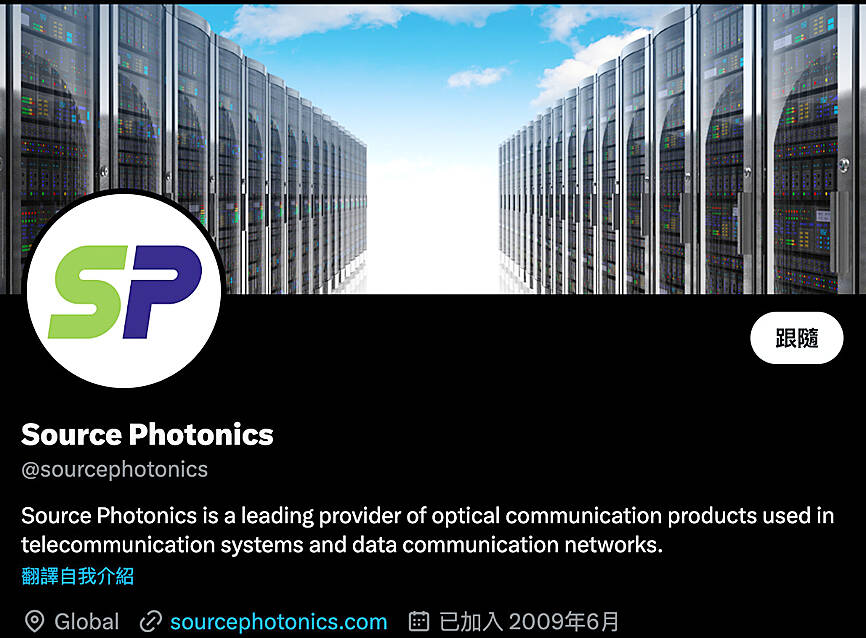The Ministry of Economic Affairs yesterday said it would conduct a “strict review” of any proposed acquisition of Taiwanese tech company Source Photonics Co (索爾思光電), following media reports that a Chinese firm was planning to buy the company in the Hsinchu Science Park (新竹科學園區).
Local media reported that Suzhou Dongshan Precision Manufacturing Co (東山精密), China’s largest printed circuit board manufacturer, had announced plans to acquire Source Photonics for 5.9 billion yuan (US$823.1 million).
The ministry said it has not received an application from Source Photonics and has formally notified the company that any buyout would constitute a change in its ownership structure.

Photo: Screen grab from Source Photonics Co’s X account
The ministry said that under regulations governing Chinese investment, any such change must receive prior approval.
Although an application has yet to be received, the ministry said it sent a formal letter to Source Photonics last month requesting details on its shareholding structure and business operations.
Once an application is submitted, the ministry would review the case together with the National Security Bureau, the Mainland Affairs Council and industrial technology authorities, in accordance with the Act Governing Relations Between the People of the Taiwan Area and the Mainland Area (臺灣地區與大陸地區人民關係條例), it said.
The review would focus on whether the deal poses a risk to national security or negatively affects industrial development, and the company’s investment permit could be revoked in line with existing regulations if any risks were found, it said.
Democratic Progressive Party Legislator Hsu Chih-chieh (許智傑) said the company possesses key 3-nanometer technology and urged the government to assess the case with caution.
Hsu also called for the establishment of a list of critical technologies to prevent sensitive semiconductor technologies from being transferred to China.
The ministry said it has monitored the company’s status since 2016, when its upper-level shareholders were classified as Chinese capital.

In Italy’s storied gold-making hubs, jewelers are reworking their designs to trim gold content as they race to blunt the effect of record prices and appeal to shoppers watching their budgets. Gold prices hit a record high on Thursday, surging near US$5,600 an ounce, more than double a year ago as geopolitical concerns and jitters over trade pushed investors toward the safe-haven asset. The rally is putting undue pressure on small artisans as they face mounting demands from customers, including international brands, to produce cheaper items, from signature pieces to wedding rings, according to interviews with four independent jewelers in Italy’s main

Japanese Prime Minister Sanae Takaichi has talked up the benefits of a weaker yen in a campaign speech, adopting a tone at odds with her finance ministry, which has refused to rule out any options to counter excessive foreign exchange volatility. Takaichi later softened her stance, saying she did not have a preference for the yen’s direction. “People say the weak yen is bad right now, but for export industries, it’s a major opportunity,” Takaichi said on Saturday at a rally for Liberal Democratic Party candidate Daishiro Yamagiwa in Kanagawa Prefecture ahead of a snap election on Sunday. “Whether it’s selling food or

CONCERNS: Tech companies investing in AI businesses that purchase their products have raised questions among investors that they are artificially propping up demand Nvidia Corp chief executive officer Jensen Huang (黃仁勳) on Saturday said that the company would be participating in OpenAI’s latest funding round, describing it as potentially “the largest investment we’ve ever made.” “We will invest a great deal of money,” Huang told reporters while visiting Taipei. “I believe in OpenAI. The work that they do is incredible. They’re one of the most consequential companies of our time.” Huang did not say exactly how much Nvidia might contribute, but described the investment as “huge.” “Let Sam announce how much he’s going to raise — it’s for him to decide,” Huang said, referring to OpenAI

The global server market is expected to grow 12.8 percent annually this year, with artificial intelligence (AI) servers projected to account for 16.5 percent, driven by continued investment in AI infrastructure by major cloud service providers (CSPs), market researcher TrendForce Corp (集邦科技) said yesterday. Global AI server shipments this year are expected to increase 28 percent year-on-year to more than 2.7 million units, driven by sustained demand from CSPs and government sovereign cloud projects, TrendForce analyst Frank Kung (龔明德) told the Taipei Times. Demand for GPU-based AI servers, including Nvidia Corp’s GB and Vera Rubin rack systems, is expected to remain high,